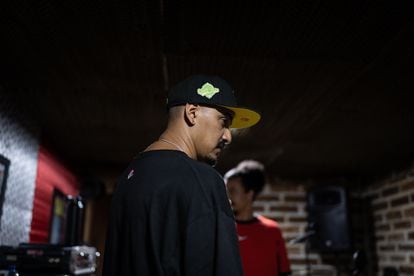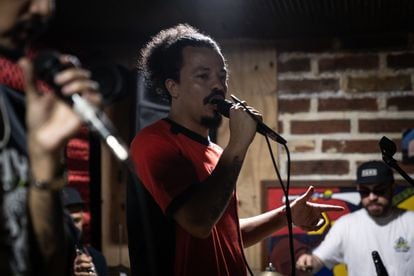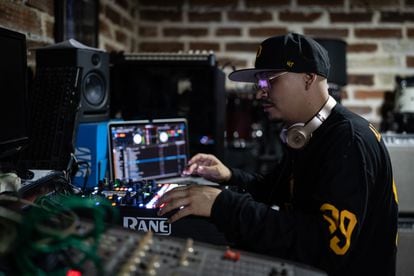They are called chroniclers of the neighborhood and the city, as in another era the salseros were. “Rap is life and it is so big that it is difficult to pigeonhole. It is chronic but it is also something else,” say the Alcolirykoz. Gambeta, Kaztro and Fazeta are three boys from the Aranjuez neighborhood, a traditional stronghold of the working class, who grew up doing rap and became the best-known band of the genre in Colombia today. It's December, Medellín looks like an open-air sauna and Medellificationtheir latest song, plays through the unstoppable roads of the neighborhoods.
“Songs are conversations,” says Gambeta (Juan Fonnegra) from his home in Aranjuez as the smell of fried slices of Maduro wafts through. “One puts scenes as if it were a movie and things like that come out (referring to the stanza: That lady just came out of mass and celebrates the beating they are giving to a kid / She screams for them to kill him because if they are thugs she prefers Colombians). But it's not like a trial because we are not morally superior. “They are situations and we count,” she adds.
Medellification It is a collage of the city's moment and also a cannon in the form of rap that shoots the latest truths that some people do not want to hear. As you hear at the beginning of the song, it is the sound of gentrification. But not only that. Kaztro (Carlos Fonnegra), Gambeta's cousin, explains it: “gentrification was the starting point, not the only thing that happened in Medellín.” Gambeta agrees. “It's not an anti-tourist speech or anything like that. It arose from several things: one is that we began to see many partners leave the neighborhood because they could not even pay rent here, which is not the most expensive neighborhood, which is popular,” he adds.
The other reason is the use of the speech of the last mayor of Medellín, Daniel Quintero, to build a city outward, to attract tourists and fill the hotels and the city with concerts. “And what about the people here? Many do not even have the means to pay for living in their neighborhoods. What happens when we stop being attractive and start looking at each other's faces? We ask ourselves and say: make the people here worthy and that's it. People are not neglected for attending the visit,” says Gambeta.

Newsletter
The analysis of current events and the best stories from Colombia, every week in your mailbox
RECEIVE THE
The song also talks about xenophobia, sexual tourism, inflation – it winks at the famous artist Antonio Caro -, cancellation and virality. And they also go head-to-head against the politicians who have wanted to use them, their success and their music without permission; and the double standards of the city. “The 1% say that poverty is mental / That dreams do come true, that we are all equal / They were born rich and flee to rural areas / To be far from us and be super spiritual,” they sing in a verse that could resonate throughout the country.
In Aranjuezthe 2021 album, Kaztro sings that his music would be of no use if it didn't offend. Medellification It may make some uncomfortable, but above all it invites us to reflect as citizens while shaking our bodies from the sticky beat. “We who have the opportunity to make songs and have them spread, we can give many people at least that information about many things that happen,” says Kaztro.
Literature came to the corner
Literature caught Alcolirykoz by surprise on the corner of the neighborhood. It was one afternoon when a friend arrived with a book borrowed from the Aranjuez library. Was Proses to read in the electric chair. The Nadaist Gonzalo Arango appeared and fell in love with this group of boys who until then hated a literature that they found heavy and distant. With that suggestive title, they devoured the book and began to pass it from hand to hand. “Gonzalo Arango was a rapper,” they say now.
The group's sound is pure rap, but you can hear clear roots of salsa, the tango that marked some neighborhoods of Medellín and playing with the iron music that mothers listened to in the 80s. Aguanilé, Changó, Ángel Canales and many others codes of salsa and bolero, whose vein is from Kaztro, as well as soccer phrases, make Alcolirykoz's rap a picture of neighborhood life. But, as they say in another of their songs, they turn everything into rap.

While literature arrived by random corner, rap always permeated their bodies. Kaztro came from freestyle; Fazeta, from the world of DJs; and Gambeta, f
rom rap. They knew each other from school and the neighborhood and the three of them were united by graffiti, but they were shy. From different perspectives, they were united by something that still keeps them together: the love of collecting and studying music. “Collecting rap was like having a mini community: when we found out that the son of the revoltero (vegetable seller) liked rap and would greet you, it was like feeling part of something important,” adds Fazeta (Gustavo Pérez).
What they liked most about the music that grew up in the neighborhoods of New York is that it was always annoying. “Rap has always been a music that goes beyond the margins and that even made us uncomfortable. “That was a joke,” they say. Although today they are recognized and loved – for the residents of Aranjuez they are a source of pride – the road has been uphill. “Even today, when someone speaks about us in a flattering way, comments come out that reflect the city: And who are those gamines?; 'if I see them on the street I'll cross the sidewalk'; 'See, why are they famous? Shouldn't famous people look different?” says Gambeta, who is also a producer.

In times of political correctness, Alcolirykoz's rap becomes big. They have criticized pornmisery and drug tourism in Simply Popeyeor the vices of the music industry in It is not for sale. But they also talk about more personal and happy stories, or life-changing moments like NOTHING, about knowing and enjoying the sea. “Who said that if we don't talk about poverty and what happens in the neighborhoods then it's not rap?” says Kaztro.
The three recognize the origin of rap in social commitment, but they defend that it is not the only thing. “Rap arose so that the pelaos would not be killed in the Bronx and moved to places like this (Aranjuez) where the pelaos continued to be killed as well. That's when Kaztro, Fazeta and I decided: 'let's not become bandits, guevón, let's do rap instead.'
The phrase sounds simple, but in the Medellín of the 80s and 90s in Aranjuez – where the drug trafficker Pablo Escobar had his main armed gang, Los Priscos -, growing up choosing music is a brave decision. Another option was soccer, and all three are soccer fans (The only party we belong to is street football). “Being a soccer player has been the way to get ahead in these neighborhoods. We couldn't do it, but rap gave us security and identity,” says Kaztro.
In the end they didn't miss being footballers. They are the rappers from the Aranjuez neighborhood and those from Medellín, those who receive with emotion in Bogotá, those who already went to “the USA”, which was a dream for them. “Feeling that the passion of some kids in a corner changes things is our true reward. Being a Paisa rapper, who raps like someone from here and continuing to do it in our own way, that is very powerful,” concludes Gambeta, also known as El Arkeologist.
Subscribe here to the EL PAÍS newsletter about Colombia and here to the channel on WhatsAppand receive all the information keys on current events in the country.
#Medellification #canyon #truths #form #rap
